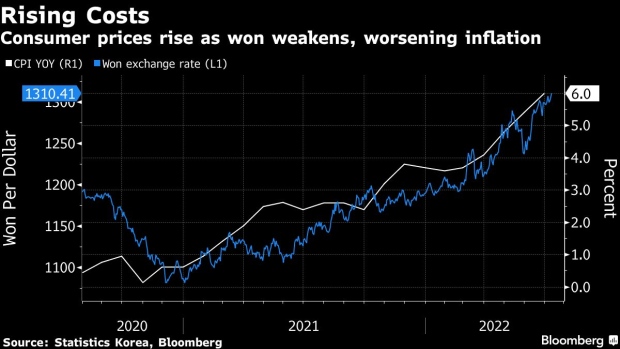Jul 12, 2022
Bank of Korea Joins Jumbo Hikers as Inflation Fight Heats Up
, Bloomberg News

(Bloomberg) -- The Bank of Korea doubled the margin of its latest rate hike on Wednesday in line with a global trend of larger policy moves, as it stepped up its battle against inflation now running at a 23-year high.
The central bank pushed up its seven-day repurchase rate by a half-percentage point to 2.25%, after five previous hikes half that size. The increase is the biggest since rates became the BOK’s primary monetary tool in the late 1990s.
Fifteen economists surveyed by Bloomberg had expected the jumbo move, while four forecast a quarter-percentage-point hike.
The decision indicates rising concern at the BOK over the need to rein in price growth that is continuing to outstrip expectations. Inflation hit 6% in June, its strongest reading since late 1998. Inflation expectations among consumers have also climbed to the highest level in a decade.
Meanwhile, the won is under pressure as the Federal Reserve accelerates its policy tightening. The currency is the worst performer in Asia after the yen this year, making its imports more expensive and worsening inflationary pressure at home.
Stock market investors took the expected rate hike in stride. Korea’s benchmark Kospi extended its gain to as much as 0.9% as foreign investors sharply reduced their net selling of Kospi equities following the jumbo rate hike.
“This is an all-out campaign against inflation for the BOK,” said Cho Yong-gu, a fixed-income strategist at Shinyoung Securities. “But this kind of hike is likely a one-off, with the BOK returning to baby steps from here.”
Cho sees the BOK considering pushing the rate potentially to 3% or just under it to rein in inflationary pressure, even though the neutral rate for the economy would be somewhere in the early 2% range.
The moves comes with risks. Concerns of a global economic recession are rising as policy tightening at major central banks raises the burden of interest payments for consumers while Russia’s war on Ukraine continues to exacerbate supply chain lags that are forcing up energy and other living costs. Some economists already see the economy shrinking this quarter.
“As South Korea begins tightening at the risk of an economic recession, expectations will rise that prices will start to reverse,” Kang Seung-won, an economist with NH Investment & Securities, said ahead of the decision. He expects the central bank’s focus to gradually shift toward growth concerns, as export momentum rapidly cools in the second half of this year.
The BOK’s jumbo hike comes even though the central bank has been in the vanguard of policy tightening since the global economy began to emerge from the grip of the pandemic last year. The Reserve Bank of New Zealand, another central bank in the leading pack of rate raisers, is also expected to push up its official cash rate by a half percentage point later Wednesday.
Since early this year, other monetary authorities have outpaced the BOK’s moves. After the Federal Reserve raised its rate by 75 basis points last month, speculation soared that the Korean central bank would also accelerate its pace of tightening to rein in consumer prices and shore up the won.
Governor Rhee Chang-yong sought to tone down the speculation, saying inflation isn’t the only concern for the BOK. He in particular cited the rising share of household loans tied to market rates, expressing concerns about the debt burden for low-income groups.
Still, Korea has been among the nations most exposed to global inflationary pressure and Fed policy tightening. Its trade deficits have been snowballing on rising energy and commodity prices while capital outflows have weakened the won to the weakest level since the global financial crisis.
The BOK and the government have slashed their forecasts for economic growth this year as inflation erodes consumer confidence. While the labor market is holding up, policymakers are increasingly worried about a price-wage spiral that would prolong inflationary pressure.
The hike is the second since Rhee took office. He met last week with Finance Minister Choo Kyung-ho and agreed to “preemptively” act to prevent macroeconomic risks with rates rising both at home and abroad, expecting a “complex economic crisis situation” to last for a considerable period.
Rhee will announce any dissenters at a press conference that starts shortly after 11 a.m. in Seoul.
Markets will be interested in knowing how board members may have differed in their preference for the pace of hikes. Rhee may also provide signals on whether the BOK will temper or maintain the speedier-than-usual policy tightening.
(Updates with economist comment)
©2022 Bloomberg L.P.






